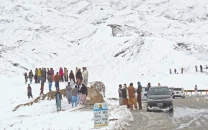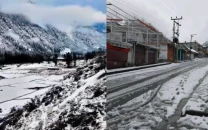Development, a casualty?
The roads are still in a shambles even in Gilgit, which is the face of the government, let alone those in valleys

Instead of a fast track progress in the wake of the reforms, the region unfortunately lost whatever progress it achieved during the Pervez Musharraf government. Today, the dilapidated roads alone in the capital city of Gilgit speak volumes about how this region has been handled over the past one decade.
Admittedly, the scenic Gilgit-Baltistan has been a victim of floods, unpredictable rains and landslides over the years, in turn, damaging roads and other infrastructure all over. Of course natural disasters can’t be undone, but certainly the damage they inflict can be, if the will to do so prevails.
There is no denying the fact Pakistan Peoples Party (PPP) in its five years of rule set precedents of bad governance. Illegal appointments and corruption scams in government departments often made headlines in newspapers. This provided bureaucracy a golden opportunity to resist Mehdi Shah government orders, which at times escalated tension between the chief minister and the chief secretary. The outcome — money was saved but at the cost of development.
But on the other hand, there were instances when the political government and bureaucracy appeared on the same page. For example in certain cases, payments were released for development projects which existed only on papers. Of course this couldn’t have happened without consent from the then finance secretaries. But no one was made answerable as Mehdi Shah obstructed any move that could call for accountability of his ministers. The Chief Minister Inspection Commission reports, which identified corruptions, were also put on the backburner. In the absence of NAB and a subservient FIA, accountability was merely a far cry from the reality.
The legacy now seems to have been carried forward by the present government. It’s been a year since the PML-N formed their government after a landslide victory and Hafeezur Rehman became chief minister, yet the pace of development didn’t live up to what was expected.
The roads are still in a shambles even in Gilgit, which is the face of the government, let alone those in valleys. Even the road passing in front of the CM office, CM house and assembly is half broken, making a mockery of Rehman’s will, power and commitment.
Of a meagre Rs10 to 12 billion set aside last year for development schemes, half of the amount stands unutilised and likely to lapse this month while utilisation of the remaining amount is also not known to many, including the deputy speaker, who spilled the beans in a press conference last week. Similarly, local body elections don’t appear on the chief minister’s priority list, nor is accountability. One can just hope bureaucracy helps its “bosses” this time around to complete projects meant for public.
Published in The Express Tribune, June 21st, 2016.


















COMMENTS
Comments are moderated and generally will be posted if they are on-topic and not abusive.
For more information, please see our Comments FAQ